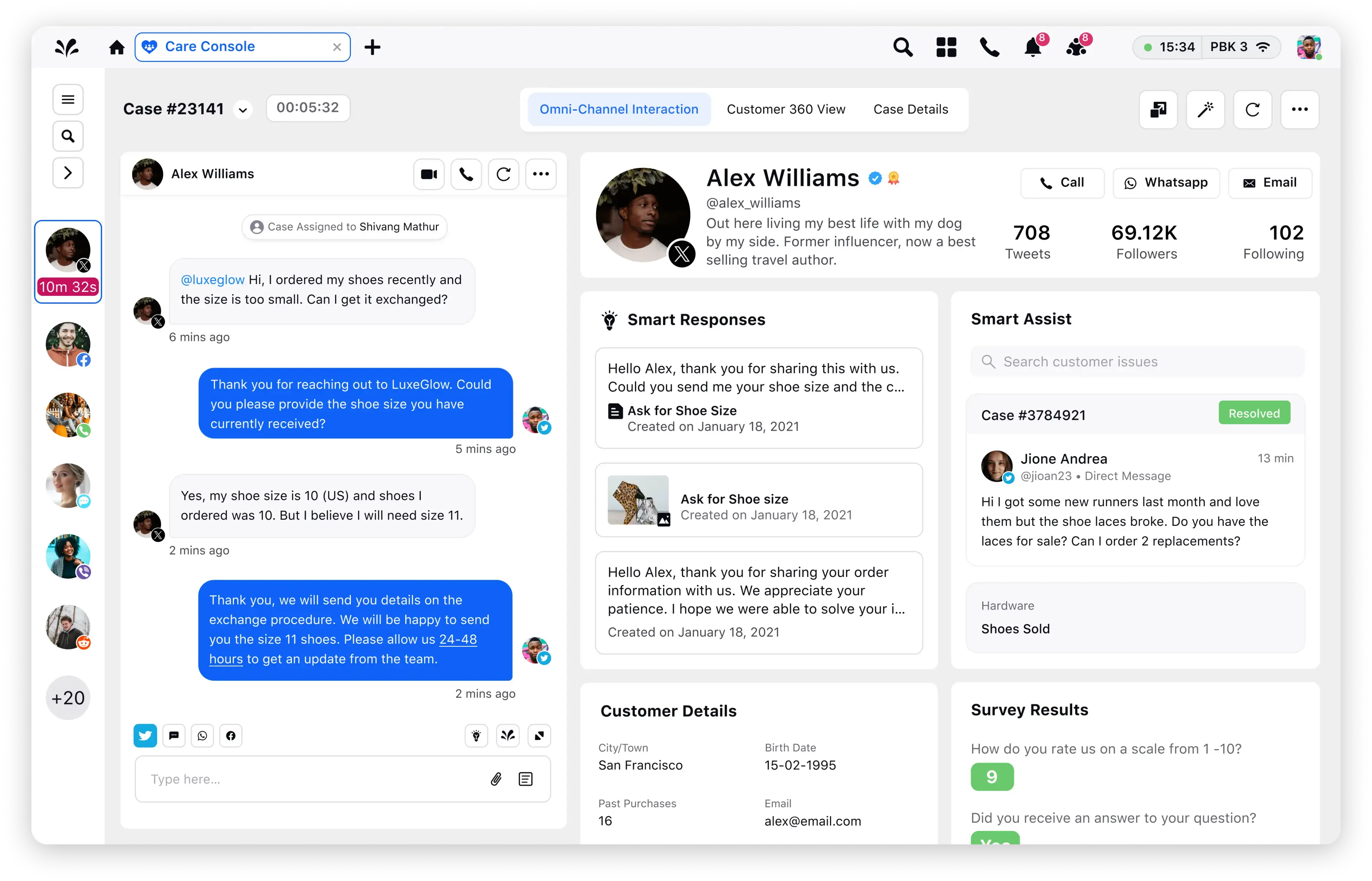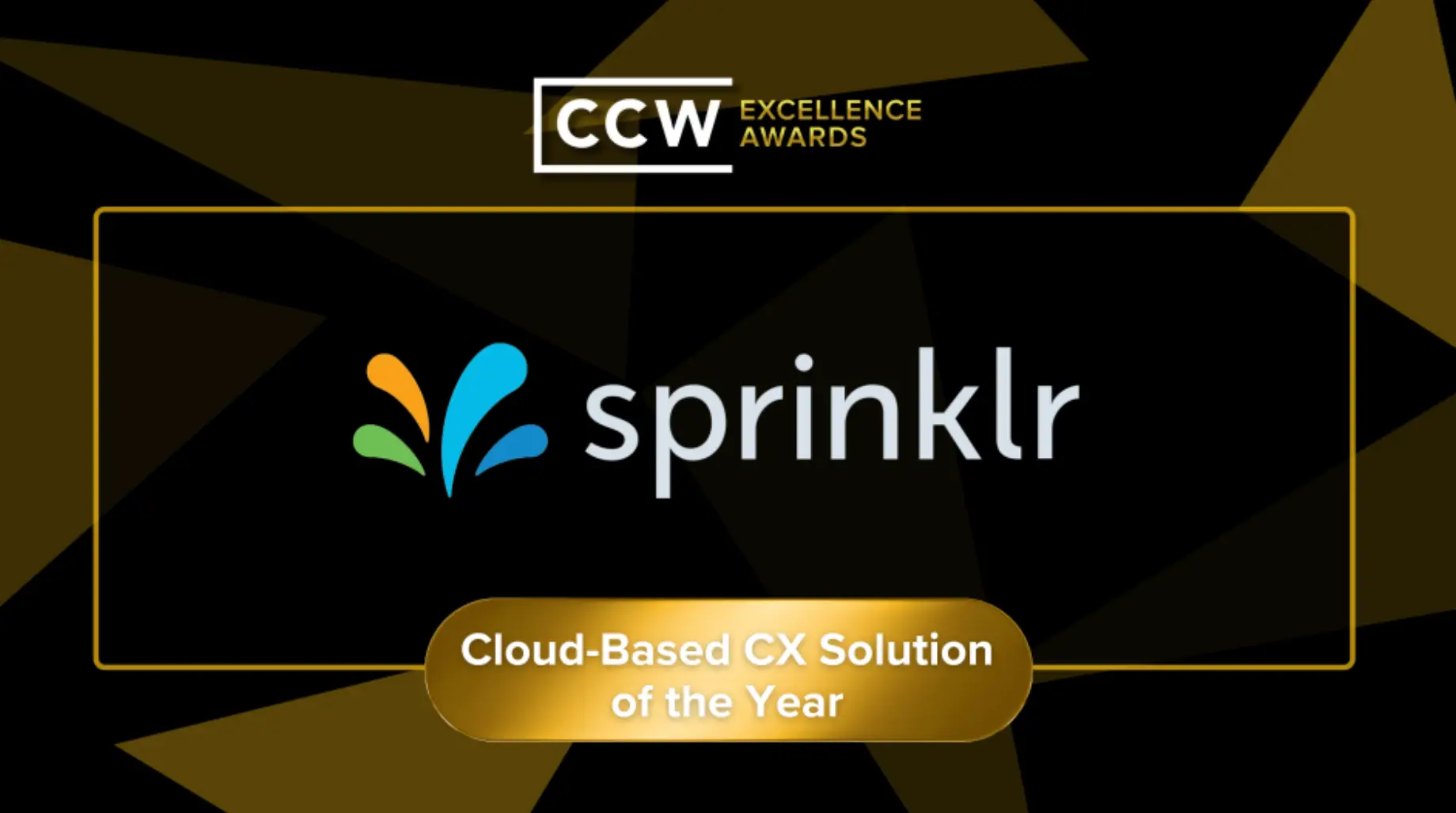The next generation of CCaaS is here
Digital-first customer service, enterprise-scale voice support. Redefine customer service with an AI-powered platform that unifies voice, digital and social channels. Power channel-less interactions and seamless resolution no matter the channel of contact.

Contact center agent: Skills, roles and best practices
Imagine the superhero of customer support — not with a cape, but with a headset and a keyboard.
Being a contact center agent is no child’s play.
Their jobs are often presumed to be easy, because all that they have to do is help, right?
But behind those screens sits someone with the patience of a saint, the empathy of a friend and the analytical finesse of a detective.
Almost half a million agents make lives simpler for countless customers in the U.S. alone. And if that seems like a big number, the contact center industry may even touch half a trillion by 2027.
In essence, agents really do embody the backbone of a thriving business.
In this blog, we'll explore the ideal traits that form the DNA of an ideal contact center agent, their duties and the key tips that make their challenging work, easier.
What is a contact center agent?
A contact center agent is a skilled professional who interacts directly with customers, handling their inquiries, providing support and ensuring their satisfaction.
Contact center agents are the vital bridge between customers and businesses. They can work as inbound agents, who primarily receive incoming calls and help customers navigate their problems.
On the other hand, there are outbound contact center agents who focus their energy on making outgoing calls to generate leads, boost sales, drive upgrades and further telemarketing efforts.
Outbound agents usually function in a more target-oriented approach.
In fact, their expertise is also a bit different from that of an inbound agent — including skills like negotiation and commercial acumen.
Inbound Contact Center Agents | Outbound Contact Center Agents | |
Role | Handle incoming customer inquiries | Make outgoing calls to customers/prospects |
Purpose | Provide customer support and assistance | Generate sales, conduct surveys, collect feedback |
Communication | Reactive: Respond to customer inquiries | Proactive: Initiate contact with customers |
Skills | Excellent listening and problem-solving skills | Excellent listening and problem-solving skills |
Training | Focus on product knowledge and issue resolution | Emphasis on sales techniques and objection handling |
Metrics | Average handling time, customer satisfaction, first response time | Call conversion rate, leads generated, abandonment rates |
Workflow | Follow predefined scripts and processes | Engage in cold calling or follow-up with leads |
Challenges | Handling irate customers and resolving complaints | Overcoming rejection and meeting sales targets |
Examples | Customer support representatives, technical helpdesk agents | Telemarketers, sales representatives |
Now, let’s understand the specific duties contact center agents perform.
Key roles and responsibilities of contact center agents
Contact center agents know that the only thing truly constant is change.
A typical day in the life of a support agent can be bland or full of surprises.
At times, they have to sift through piles of similar queries or get slammed with extraordinary customer problems — they must always stay vigilant and alert.
Here are the usual responsibilities and duties of a contact center agent has to take on.
1. Respond to inbound queries
This is the key responsibility of a contact center agent. It often takes up a major chunk of the agent’s productive day.
Agents promptly answer questions and dispel doubts customers raise via many touchpoints — phone calls, chat and social media. The types of queries and issues agents often have to answer are:
- Business-related information like policies, hours, shipping options
- Time-sensitive questions that are seasonal, promotional and sale-related
- Help tickets that often require an agent’s technical and product expertise
It’s the agent’s duty to narrow-down to a proper solution and effectively communicate it to the customer.
2. Ensure a smooth order process
Order processing is a function that impacts revenue, so every missed opportunity directly reflects on the P&L.
Customers with strong purchase intent would often call in to ask about the product and other important details like warranty or replacement guidelines.
These conversations are quite literally a matter of vitality or fatality.
It’s an opportunity for agents to instil a sense of confidence and surety in the product. A way to ensure that customers don’t consider a competitor instead of you.
A contact center agent must be able to answer all defining questions like:
- Do you have features to solve problem?
- What payment options do you support?
- Do you take payment in instalments?
- I was also checking out competitor, how are you different?
- Will you customize product to solve the specific issue I am facing?
And agents shouldn’t just be adept in ensuring smooth conversions — they must also seamlessly process refunds, exchanges and replacements.
3. Tackle complaints and escalations
An outraged customer is like a ticking bomb. They don’t just want a solution — they want it quickly and with low customer effort.
Now is not the time to assign your rookie agents as such high-tense situations need extra care and precision.
While such interactions may seem grim, they are fantastic opportunities to mend customer relationships.
Agents must turn themselves into reliable confidants.
At the risk of sounding cliché, the only way out is through compassion.
- Listen attentively and let the customer express their issue or even rant, without interrupting
- Accept responsibility for the issue, even if it wasn’t directly your fault — customers want acknowledgement
- Validate their situation and ensure that you are here to find a solution as quickly as possible
- Assure them with real-time updates and be available to support them until the issues is resolved
Point to note: Agents dealing with escalations and serious grievances must be even more careful. Actively engage with your customer in collaborative brainstorming to find or build the best possible solution. Consider giving them multiple options to empower them to choose the ideal solution for themselves.
Get pro: Understanding and setting up an escalations management workflow
4. Ensure seamless context inflow
Let your customers know you understand them.
Over 71% of customers expect businesses to personalize their interactions. No surprises there, right?
But here's the kicker: 76% of customers get annoyed when brands fail to do it.
Customers don’t want to repeat themselves. And 76 is too big a number to let go.
It’s the role of the contact center agent to get it to zero.
Customers might restart the same conversation and they might do it from 10 different channels — agents should never stay uninformed.
Agents are responsible to switch contexts and deliver relevant solutions swimmingly.
When they never require the customers to repeat anything already shared, agents can drastically reduce average resolution times.
Customers want you to connect the dots on your own, always.
Explore more: Best practices to deploy omnichannel customer service
5. Make sales, follow up and reminder calls
Service agents are the unsung heroes of other departments in a company.
Sales teams depend on the leads generated by outbound agents.
As these high-intent prospects are duly qualified, sales teams find it easier to engage and drive them to conversions.
Outbound contact center agents are also responsible for aiding customer success. They follow up with current accounts and upsell/cross-sell products that align with their needs.
Moreover, agents make calls to remind customers about appointments, upcoming payments and validity expirations.
Contact centers often use predictive dialers to automatically queue up customers for agents to talk to, so no time is wasted in manual dialing.
6. Collect, analyze and implement customer feedback
To stay current with customers, contact centers keep improving their services. Agents are undeniably an active part of it.
They are constantly in touch with customers — day in, day out. Getting to the crux of concerns and hold-ups is relatively easier and more accessible to them. Agents can:
- Collect real-time feedback after a live-chat session to gauge the immediate level of satisfaction
- Urge customers to share detailed feedback and suggestions through dedicated post-interaction forms
Doing so serves as the groundwork for quality management to identify trends, develop and deploy restorative solutions.
7. Conduct market analysis
Contact center agents interact with customers on many platforms.
Customers pour in from all directions — expressing what they want, what’s working for them and the changes they’d like to see.
Regularly diving into the voice of the customer also helps you to know where the competition stands.
Such information is of immense value for contact centers.
- Social listening tools help you to surface explicit (and latent) notions of the customers on social media
- Combing through historic conversations highlights recurrent issues and customer grudges that can potentially bubble
- Market analysis also aids contact centers in finding and acting on the reasons customers quote for switching sides — which can ower call abandonment rate and boost customer retention
8. Keep customer data accurate
Contact centers keep a thorough repository of data customers relay via range of interactions over a period.
Every now and then, it becomes subject to change.
And it becomes the responsibility of a customer service agent to ensure that CRMs are always updated with information like:
- Contact details
- Demographic data
- Purchase history
- Payment history
- Shipping preferences
- Conversational history
It’s crucial that it is updated in real-time because agents will always refer to this information to drive future interactions. Updated data helps in devising personalized solutions for customers.
9. Orient, train and upskill new hires
Every hire is confused in the initial days of a new job.
Competition is rife in the customer service industry — so new agents need to quickly pick up on contact center skills to excel at their jobs.
Seasoned agents are often responsible for orienting rookies. Here are a few ways they do it.
- Buddy system: pairing new hires with experienced agents for guidance and support
- Shadowing: allowing new agents to observe senior agents in action
- Training sessions: conducting formal agent coaching sessions to impart key skills
- Role-playing: engaging in simulated scenarios to practice and hone skills
- Mentorship and Q&A: assigning mentors for personalized guidance and encouraging interactive Q&A sessions
These engaging programs help hires ease into their workplace, avoid blunders and perform efficiently in real-life situations.
Skills and qualities of contact center agents
As an agent, do you wonder if you have what it takes to shine bright at work?
Some skills are essential prerequisites — others are easily acquirable on the job.
Practically speaking, being an awesome contact center agent is less about degrees and more about rocking a can-do attitude.
However, a diploma may still be the minimum requirement for most contact center jobs.
Employers in niche industries such as deep tech and BFSI may have specific skills as a job requirement.
Putting that aside, here's a rundown of the skills and qualities that turn a good contact center agent great.
1. Be a smooth talker
Agents must be great conversationalists and show more empathy in customer service.
Talking well is a skill and it’s important for agents to know how to. They should be like linguistic acrobats — effortlessly adapting their communication style to match each customer's personality — from the chatty Cathy to the concise Carl.
2. Be a multitasking maestro
Considering that agents are expected to do eight different things at the same time, they should know how to juggle several tasks.
While this is ideally a skill a busy agent should have, there’s a workaround.
A contact center solution that integrates every external platform can help you save the mental bandwidth needed to work with multiple tools.

3. Be a troubleshooting ninja
Customers might take long to explain their concern. You might find yourself getting derailed from the conversation — always keep a sharp problem-solving mindset.
Customers might feel helpless, or sound emotionally charged — but there’s nothing they’d love more than just finding a solution.
Stay focused and work with them to find an answer ASAP. To solve problems quickly, ask the right questions.
- What ways have you already tried to fix this issue?
- Are there any preferences or specific outcomes you have in mind for a resolution?
- Have you previously encountered this issue?
- Could you please share relevant documents that may be of help?
To stay focused at the issue at hand:
- Use Pomodoro: This technique involves working in focused sprints followed by short breaks. Setting specific time blocks for uninterrupted problem-solving allows you to maintain focus and avoid getting overwhelmed.
- Make notes: Take detailed and organized notes of real-time conversations to capture essential information. This way you can have a clear reference point to circle back to and stay on track with problem resolution.
- Go visual: Three days later, people still retain 65% of visual information, whereas only 10% of audible information remains in their memory. Agents can utilize visual aids, such as flowcharts, diagrams or checklists, to visualize the problem-solving process.
4. Be detail-oriented
Be keen. Be detail oriented. Be acutely aware.
Your customers want to feel important and want to know that you were actively listening.
Don’t make them repeat anything twice.
You wouldn’t want that as a customer. They don’t want it either.
Do you research on the customer and always be prepared to respond with a solution.
For example, do something without them asking for it.
If they talk about a product but don’t convert in the first interaction because they were unable to make payment, be ready to give them variety of payment routes that may be workable in next interaction — maybe EMIs or credit options.
5. Be a product pro
A big chunk of customer tickets is often about a technical problem.
And a good quality of a contact center agent is that they know the product inside out. They know the product manual by heart and know the specifics of it.
So, every time a customer asks about a technicality holding them up, agents should always know how to solve it.
Agents can have specific product knowledge help articles on-the-go to help them fetch the right information in time. Technical knowledge should be simpler and accessible.
Know more: How does a knowledge base brings product help on fingertips?
6. Be cool as a cucumber
Whether the calls are ringing off or chat sessions are pinging away, a contact center agent must remain calm.
Being in the midst of all the commotion is nothing new to them. So, learn how to embrace the chaos.
It is the true mark of a great contact center agent.
While these are the few most important qualities and skill of a customer service agent, here a few more nice-to-haves.
- Multilingualism
- Cultural sensitivity
- Creative problem-solving
- High tech aptitude
How to become a great contact center agent?
I discussed many skills you need to excel at your job as a contact center agent. However, what are some best practices you should follow a rule of thumb?
1. Value time
It’s “one of those days” every day for contact center agents. It’s always rush hour.
Ensure you understand the importance of valuing your and customers’ time. Prioritize tickets based on urgency and run through your tasks like a checklist.
2. Take the moral high ground
Even when you feel you shouldn’t.
Imagine a customer goes “This is your fault! I’m still stuck with this, I’m gonna get you fired!” even when you know it isn’t your personal responsibility.
Display high emotional intelligence, validate their problem and always remain professional. It might be tough, but you are tougher!
3. Go the extra stretch
Don’t just do the bare minimum. Take the customer by surprise!
They will remember your service and might even name drop you with praises in a positive review.
For example, let’s say a customer reports an issue with upgrading their service on your music streaming platform.
Customer: “I haven’t been able to upgrade my account for 3 days and I'm at my wit's end!”
You: “I understand how frustrating that must be for you. Let's not waste another moment. I'll personally dive into this issue right away, work closely with our technical team and keep you updated every step of the way. Consider it my mission to put an end to this problem once and for all!”
[Problem gets resolved]
You: “I hope you’re able to listen to your favorite music with no interruptions! Such instances are rare and so I’d also like to offer you two weeks extension on your current plan. Please enjoy it on the house!”
A simple gesture such as this might truly make their day.
4. Prioritize self-care
Contact centers are high-stress environments. There’s just no denying that, I know.
So, you must prioritize self-care. Your health and me-time matter just as much. When you feel healthy, you’ll always perform best at work.
Let’s take the example of Brody and Phil, who recently made an appearance on a Reddit post after the poor pandas let the anxiety take over.
Remember to take breaks. Talk to your manager and let them know what you’re going through. Rest it out. Practice mindfulness and engage in activities that rejuvenate you.
And as the wise redditor Which-Suggestion7931 says, use call center automation to get rid of mundane, monotonous tasks!
Let a bot help you while you help yourself.
Lending a helping hand: How to manage call-center stress and become a happier agent
Contact center agent performance metrics
What gets tracked, gets cracked.
So, to crack a way to improve your contact center is to measure, assess, deliberate and improve your performance.
Quality monitoring and control metrics:
- First contact resolution: gauge how many tickets you are resolving on the first contact, without a need for follow ups.
- Customer Satisfaction (CSAT): evaluate how happy a customer is with your performance and the service provided, often measured through post-interaction surveys.
Handling time metrics:
- Talk time: is the duration of time you spend actively engaged in conversation with a customer during a call.
- Hold time: measure the time you put a customer on hold or wait for assistance, affecting handling time.
- After-call work time: refers to the time you spend completing necessary tasks after the call, such as updating records or notes.
- Abandoned cases: How often are customers abandoning their chats/calls after getting connected to you
Schedule adherence metrics:
- Average speed of answer: measure the average time it takes for calls/chats to be answered by you, indicating the time it takes to connect to an agent.
- Service level: define the percentage of calls that are answered within a specified timeframe
- Interactions per issue: track the average number of interactions required to resolve a single customer issue, reflecting your efficiency in resolving complex problems.
- Dial transfer rate: measure the frequency at which calls are routed to other departments or agents, affecting customer experience and resolution time.
- Quality assurance (QA): evaluate recorded interactions to assess your adherence to predefined quality standards. Measure factors such as professionalism, accuracy, compliance with guidelines and adherence to company policies.
Each of these metrics correlate to the actual performance your agents give in your contact center.
A sure-fire way to routinely check, spot and intervene when neccessary is through an independent supervisor control — a single key to unlock agent productivity.

FAQs
1. What is the role of contact center agents?
Contact center agents play a pivotal role in bridging the gap between customers and businesses. They provide personalized help and resolve inquiries, serving as the frontline ambassadors of the company's brand and reputation.
2. What are the skills of good contact center agent?
Good contact center agents exhibit:
- Interpersonal skills
- Aptitude to navigate complex customer interactions
- Empathy
- Adaptability
- A knack for problem-solving
They have a genuine passion for delivering top-notch service and possess strong attention to detail and effective time management abilities.
3. How to become a contact center agent with no experience?
To jump into the world of contact center agents with no experience, start by polishing your communication game and diving into customer service scenarios. To get an advantageous start, consider pursuing:
- High school diploma or equivalent: Most contact centers require either as a minimum educational qualification
- Language or linguistics courses: Taking language courses or linguistics classes can improve communication skills, especially for agents serving multilingual customer bases or specific language requirements
- Degree or certification: A relevant degree or certification in customer service, business administration, communications or related fields can enhance your credentials.
- Computer and technical skills: Being familiar with basic computer operations, customer relationship management (CRM) systems or contact center software is a plus.
Embrace entry-level opportunities or internships to get hands-on experience. Show your enthusiasm and hunger to learn.

